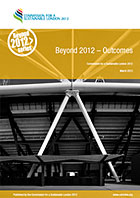
The most widely used definition of sustainable development was developed in 1987 by the World Commission on the Environment and Development, also known as the Brundtland Commission. Their definition was:
“development that meets the needs of the present without compromising the ability of future generations to meet their own needs”
Sustainable Development is not just concerned with environmental issues; there are three pillars of sustainable development: ‘environmental, social and economic’.
The London bid for the 2012 Olympic and Paralympic Games promised that London would be ‘the first sustainable Olympic and Paralympic Games’ and a ‘One Planet Olympics’. The concept of a ‘One Planet Olympics’ was developed by the London bid company in partnership with WWF and Bioregional. It is based on Bioregional and WWF’s work on ‘One Planet Living’, which highlights the need for society to live within the means of the Earth’s resources. If everyone in the world used resources at the same rate as an average European, we would need the resources of three planet Earths.
The concept of a One Planet Olympics has been integral to the London 2012 sustainability plans. With this is mind, London 2012 identified five key sustainability themes, areas in which they feel they can have most impact. These are:
- Climate change: To provide a platform for demonstrating long-term solutions in terms of energy and water resource management, infrastructure development, transport, locally seasonal food production and carbon impact mitigation and adaptation. We aim to minimise the carbon footprint of the Games and legacy development, notably by minimising embodied impacts and optimising energy efficiency, energy demand and use of low carbon and renewable energy sources.
- Waste: To be a catalyst for new waste management infrastructure in east London and other regional venues and to demonstrate exemplary resource management practices. We will minimise waste at source, divert construction waste wherever feasible and all Games-time waste away from landfill, and promote the waste hierarchy of ‘reduce, reuse, recycle’ to facilitate long-term individual behavioural change.
- Biodiversity: To enhance the ecology of the Lower Lea Valley and other London and regional 2012 venues, and to encourage the sport sector generally to contribute to nature conservation and bring people closer to nature.
- Inclusion: To host the most inclusive Games to date by promoting access, celebrating diversity and facilitating the physical, economic and social regeneration of the Lower Lea Valley and surrounding communities.
- Healthy living: To inspire people across the country to take up sport and develop active, healthy and sustainable lifestyles.
These are wide ranging areas and challenging objectives. The Commission monitors and assures London 2012 activities which relate to these key themes. It also monitors and assures progress against the objectives, targets and milestones. Each year the Commission sets out an Annual Review to look at the programme overall and also thematic reviews to look at specific themes such as waste. All the Commission’s reports are available on this website.
